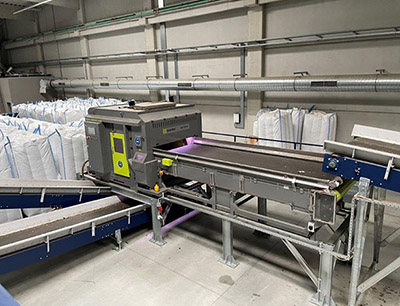
Croatia's accession to the European Union has also brought the topic of recycling into focus. The aim here is to implement the EU's waste directives and current targets and, above all, to drive forward the circular economy at national level. The EU target of recycling more than 65 percent of municipal waste by 2035 paves the way for a sustainable circular economy. An example from the field of plastic packaging shows that distributors and manufacturers of such packaging in particular see it as their duty to make their contribution to the circular economy for greater environmental protection and resource conservation. The aim is to use recycled material in the production of PET drinks packaging and to continuously increase the proportion of recycled material used. Purity is the decisive factor when using PET recyclate. Only pure, high-quality recyclate can be reused for a wide range of new products and especially for beverage packaging.
The Austrian beverage manufacturer Steinrieser and the newly founded Austrian-Croatian trading company for beverage production Kis Pica have joined forces and set up a PET recycling plant in the Donja Dubrava region of Croatia for the reprocessing of disposed plastic bottles. The Rekis PET recycling plant produces up to 18,000 tons of high-quality rPET granulate every year, which is then reused in the production of beverage bottles. In Croatia, plastic bottles are collected via the existing deposit system, but also via municipal collection points. In addition, Rekis obtains collected plastic bottles from Austria, Slovenia, Slovakia and the Czech Republic. The material is delivered in compressed bales, separated and passed through an eddy current separator to separate it from aluminum cans. A multi-stage sorting process follows in order to obtain pure PET material for use in the food sector from the plastic bottles prepared in this way. At Rekis, multi-sensor sorting systems from Sesotec are used to reliably separate plastic bottles and, in a further step, plastic flakes into pure types.
In the first step, the bottles pass through the "Varisort+" multi-sensor sorting system. PET clear is positively sorted: PET plastic bottles and clear plastic bottles are specifically rejected. These then enter the next sorting stage. Unwanted plastic bottles are actively suppressed and end up with all other materials in the re-sorting stage. The advantage of this sorting process is that the target fraction is positively identified and collected. All other materials such as stones etc. are rejected and no longer interfere with the rest of the process.
In quality sorting, the material is checked for foreign substances in order to remove them from the material flow and ensure the required purity. Unwanted polymers such as PVC, PE/PP and colored PET, bottles with labels or even metals are reliably detected and rejected. The Varisort sorting systems are equipped with Sesotec Flash technology. This means that bottles with special colors such as silver, opaque or TiO2-colored as well as bottles with very low color saturation can be detected. This leads to a significant improvement in the quantity of good material and an increase in safety. The remaining, non-sorted material from the two sorting systems is fed to another multi-sensor sorting system "Varisort+ CMN", where it is again positively sorted for clear PET. What remains is a mixture of colored PET bottles and other waste. Finally, a manual quality check is carried out and a metal detection bridge is used to identify metals before the material enters the granulator.
In the next step, the sorted material is shredded into flakes. This is followed by washing and cleaning processes. The "Flake Purifier+ CMN" multi-sensor sorting system takes over the fine sorting of the PET flakes produced by the shredding process. Metals, off-colours and unwanted polymer types are reliably detected and rejected. In order to reduce the loss of good material to a minimum, the material rejected in the first pass is re-sorted via a residual track.
Reki's plant manager Filip Hozjan emphasizes: “The Sesotec multisensor sorting systems are the heart of our plant. Only reliable and, above all, precise sorting enables us to obtain high-quality, color and grade-pure rPET that can be further processed into food-grade rPET pellets. These high-purity flakes are used by beverage producers as starting material for the production of new bottles. The cycle is closed.“